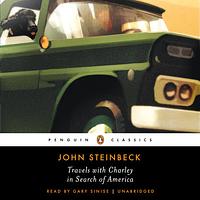Take a photo of a barcode or cover
I adore Steinbeck’s lucid, simple writing. He cuts to the point and the words flow effortlessly from the page. As a tree-lover, his descriptions of redwoods had me bubbling over. It’s time to go buy a camper.
adventurous
funny
informative
inspiring
reflective
fast-paced
eat your heart out Jack Kerouac
In a symphony of asphalt and sky, John Steinbeck orchestrates a poignant journey across the heartstrings of America in his masterwork, 'Travels with Charley: In Search of America.' With the eloquence of a seasoned storyteller, Steinbeck beckons readers into a realm where the essence of a nation thrums beneath the surface of every mile traversed. 'To hear the speech of the real America, to smell the grass and the trees, to see the colors and the light,' he intones, setting the stage for a pilgrimage of the soul.
Yet, as with any odyssey, the tempo of Steinbeck's narrative is measured, a slow dance with the landscape and its inhabitants. For some, this may prove a challenge, a labyrinth of prose that demands patience and a willing suspension of haste. In the throes of unfamiliarity with the epoch of '1960s America,' the labyrinthine passages may feel labyrinthine indeed, requiring a delicate threading of context and historical nuance.
Ah, but within these pages lie treasures aplenty, gems of humor that sparkle amidst the somber hues of introspection. Steinbeck's pen, a maestro's baton, conducts laughter through the corridors of his tale, infusing even the most arduous passages with a buoyant wit. Through his eyes, America unfurls in kaleidoscopic splendor, each encounter a brushstroke upon the canvas of the collective consciousness.
For the uninitiated, America may be but a shadow play, cast upon the silver screen of Hollywood's imagination. Yet, Steinbeck, with his keen gaze and tender heart, unveils layers of truth, peeling back the veneer of spectacle to reveal the beating heart of a nation. His lens becomes a clarifying glass, refracting light upon the contours of a land both familiar and foreign.
Among the tapestry of recollections, one finds moments both tender and tumultuous, each imbued with a raw authenticity that resonates long after the final page is turned. From the whispered secrets of a Texan soirée to the searing crucible of New Orleans' desegregation crisis, Steinbeck bears witness to the spectrum of human experience, evoking echoes of Harper Lee's 'To Kill a Mockingbird' or Toni Morrison's 'Beloved.'
'Travels with Charley' transcends its pages, becoming not merely a book but a companion for the journey of life. It is a testament to the enduring power of words to illuminate, to educate, and to inspire. And perhaps, like the author himself, we too shall find solace in the company of a faithful canine companion, as we navigate the highways and byways of our own quest for meaning.
Yet, as with any odyssey, the tempo of Steinbeck's narrative is measured, a slow dance with the landscape and its inhabitants. For some, this may prove a challenge, a labyrinth of prose that demands patience and a willing suspension of haste. In the throes of unfamiliarity with the epoch of '1960s America,' the labyrinthine passages may feel labyrinthine indeed, requiring a delicate threading of context and historical nuance.
Ah, but within these pages lie treasures aplenty, gems of humor that sparkle amidst the somber hues of introspection. Steinbeck's pen, a maestro's baton, conducts laughter through the corridors of his tale, infusing even the most arduous passages with a buoyant wit. Through his eyes, America unfurls in kaleidoscopic splendor, each encounter a brushstroke upon the canvas of the collective consciousness.
For the uninitiated, America may be but a shadow play, cast upon the silver screen of Hollywood's imagination. Yet, Steinbeck, with his keen gaze and tender heart, unveils layers of truth, peeling back the veneer of spectacle to reveal the beating heart of a nation. His lens becomes a clarifying glass, refracting light upon the contours of a land both familiar and foreign.
Among the tapestry of recollections, one finds moments both tender and tumultuous, each imbued with a raw authenticity that resonates long after the final page is turned. From the whispered secrets of a Texan soirée to the searing crucible of New Orleans' desegregation crisis, Steinbeck bears witness to the spectrum of human experience, evoking echoes of Harper Lee's 'To Kill a Mockingbird' or Toni Morrison's 'Beloved.'
'Travels with Charley' transcends its pages, becoming not merely a book but a companion for the journey of life. It is a testament to the enduring power of words to illuminate, to educate, and to inspire. And perhaps, like the author himself, we too shall find solace in the company of a faithful canine companion, as we navigate the highways and byways of our own quest for meaning.
I know that there's a bit of controversy surrounding the veracity of this book, but I took it with a grain of salt and thoroughly enjoyed it. I especially enjoyed his thoughts on the redwoods in California and his visit to Texas. Very insightful about the soul of America, and I think the book holds up. His writing of course is as always sublime. Would very much like to read his book on Russia.
adventurous
informative
reflective
slow-paced
It wasn’t quite what I hoped for, but it was a good story. Interesting that the 1960’s point of view isn’t too far off from the 2020’s.
adventurous
emotional
informative
inspiring
reflective
slow-paced
adventurous
emotional
funny
informative
inspiring
reflective
medium-paced
Thoroughly enjoyed the journey with Steinbeck as he travels the country and notes the changes it made behind his back as he grew old. In a way it was comforting to hear someone say in the 60s how built-up and unrecognizable the country was - it sets in perspective how baselines are always changing and maybe things are never as bad or as good as we perceive them. There was a mix of hopeless sentimentality for and clear-eyed criticism of America that felt right to me and made me very emotional. Whether or not the trip and conversations it contained really happened as he described feels unimportant. He tapped into this specific American feeling of wanting to know America, and in trying, finding that, as he says, “I cannot commend this account as an America that you will find. So much there is to see, but our morning eyes describe a different world than do our afternoon eyes, and surely our wearied evening eyes can report only a weary evening world”. In other words, “external reality has a way of being not so external after all”.
Wow - beautifully written. I read my first Steinbeck in the late 60's and the 2nd in the early 80's... why on God's green earth did it take me so long to read the third? There will be many more in my future - I think I will make it my life's goal to read everything he has written.
Filled by a desire to see his country one more time, John Steinbeck has a truck modified to be a camper. Named Rocinante, after Don Quixote's horse, and equipping it with guns, books and other essential items, not forgetting Charley his dog, he sets off on his journey.
His 10,000 mile journey takes him on a circular route around the country, starting in the north east, he travels across to the Pacific, down to California, along to Texas and the deep south and back up to New York. On his trip he writes about the things that he see, and the people he encounters. All the while he sees with the eye of an author, noting where those parts of the country still held to long developed habits and other parts that had changed since his last visit. But mostly he wanted to immerse himself in his country once again.
I really enjoyed reading this book. Even though it is thought that the some of the conversations that he recounts were either fictionalised, or a certain amount of licence was exercised in their creation, it could also be that he wanted to protect the identity of those folks. The moment when he travels, America is on the cusp of immense social change, desegregation in the deep south is one of the events he documents, and in his writing you sense this.
But what mostly comes across is a man seeing for the last time the country he loves deeply, meeting its people and immersing himself in it.
I printed once more on my eyes, south, west, and north, and then we hurried away from the permanent and changeless past where my mother is always shooting a wildcat and my father is always burning his name with his love.
His 10,000 mile journey takes him on a circular route around the country, starting in the north east, he travels across to the Pacific, down to California, along to Texas and the deep south and back up to New York. On his trip he writes about the things that he see, and the people he encounters. All the while he sees with the eye of an author, noting where those parts of the country still held to long developed habits and other parts that had changed since his last visit. But mostly he wanted to immerse himself in his country once again.
I really enjoyed reading this book. Even though it is thought that the some of the conversations that he recounts were either fictionalised, or a certain amount of licence was exercised in their creation, it could also be that he wanted to protect the identity of those folks. The moment when he travels, America is on the cusp of immense social change, desegregation in the deep south is one of the events he documents, and in his writing you sense this.
But what mostly comes across is a man seeing for the last time the country he loves deeply, meeting its people and immersing himself in it.
I printed once more on my eyes, south, west, and north, and then we hurried away from the permanent and changeless past where my mother is always shooting a wildcat and my father is always burning his name with his love.





